
Thriller writers are a special breed; perhaps no one knows that better than best-selling author Karin Slaughter. Creator of several ultra-popular crime series, Slaughter believes that the reasons are twofold. First, crime writers are gifted at telling stories with a specific, satisfying arc. "Something has to happen in the beginning and something has to resolve in the end," Slaughter tells Bustle. "That seems very obvious, but if you read a lot of non-thriller books, you understand what I mean."
The second is that a lot of readers connect on a basic level with domestic novels - and when things go awry, as they so often do in a Slaughter novel, the results can be particularly unnerving. Oh, and there's, of course, the reader base: "Speaking completely without bias, thriller readers tend to be the smartest, most attractive readers ever." Aww, thanks, Karin!
Slaughter's latest novel, The Kept Woman, is the most recent in the Will Trent saga, set within the Georgia Investigative Bureau. So what does it take for readers to remain attentive through eight installments (or, more accurately, six novels and two novellas)? Well, first you need complicated characters. A lot of them.
As fans already well know, Will Trent is an investigator with a troubled past and a litany of tenuous relationships with women. There's Faith, his investigative partner; Sara, his long-term lover and newly hired co-worker at the GBI; and Angie, his childhood orphanage pal, former lover, and general troublemaker.
In The Kept Woman, Will is called to a brutal crime scene at a construction site, and immediately, problems arise. The site is owned by a powerful local athlete, one Will has already attempted to put in jail for previous crimes. The dead body is that of an ex-cop's. Oh, and most of the blood? It doesn't belong to the victim. It belongs to a mystery woman who has seemingly fled the scene - and is in danger of dying if she isn't found soon. Yes, problems. Sooo many problems.
But what makes Slaughter's writing so binge-worthy isn't the litany of plot twists - it's the empathy and honesty with which she treats deeply flawed characters. Rather than utilize them as vessels for lessons on morality, she grants them respect and the opportunity to evolve as people do in reality. When you read a Slaughter novel, the characters are relatable. You know them.
Slaughter recently spoke to Bustle about writing within a series canon, tough female writers, and that bane of fiction writers - the "likeability" factor.
1. As a writer, Karin feels it's her duty to treat humans with compassion
"I have always thought an author’s most important tool is empathy," says Slaughter. "This is not to say that I feel sympathy for bad people, but I always seek to understand why they do the things they do. There is always a reason, and that reason, to me, is the heart of that character."
2. And she treats her characters like, well, humans
"I don’t feel a strong need to make my characters likeable. I write them for who they are, and I want readers to understand why they make the choices they do." Fans of the Will Trent series will notice this kind of honesty particularly with Angie Polaski, Will's childhood friend and source of much turmoil.
"Angie is the way that she is because it is part of her psychological pathology. She (and Will) endured some really terrible stuff growing up. Angie internalized it one way and it made her tough as nails," she explains. "Angie may be self-involved but it’s how she protects herself. It’s okay to not like her so long as you want to know what she is going to do next."
3. She finds inspiration in female writers "behaving badly"
Growing up in Georgia, Slaughter was drawn to Flannery O'Connor, the barrier-breaking Southern Gothic writer. "Her stories are shocking, hilarious, and at times brutal," says Slaughter. "Reading them as a little girl in a very small southern town, it was a revelation to see that a woman could get away with telling stories that weren’t the kind you’d tell in polite company."
4. She considers series writing and "standalone" writing two different beasts
As someone who has written a total of 16 novels (!!!!), Slaughter is familiar than most with the nuances of writing within an established canon versus writing a standalone book. "One of the great things about writing a series is that I am able to give greater breadth to individual characters as the series evolves," she says. Within the Will Trent series, for example, we've been able to watch the relationships between Will and the women in his life - Sara (his lover), Faith (his investigative partner), and Angie (his childhood friend) - evolve essentially in "real" time. But that's not to say that standalone writing doesn't come with its own perks.
"When I write a standalone I have more freedom in terms of range (I can kill them all because you’ll never see them again!), but I also have to really hone in on these new characters that I am just getting to know and make them distinctive and compelling. I never want a standalone to read like a Grant County or a Will Trent book. What’s the point of doing something new if it’s still the same?"
5. Oh, and this best-selling author's tip for writing best-sellers? Don't.
Or at least, don't intentionally seek that best-selling crown (obviously easier said than done). Citing Gillian Flynn's massive success with Gone Girl, Slaughter's best advice for fledgling writers is to just write. "There’s no way to anticipate the zeitgeist, and if you try to chase it, invariably, you’ll end up failing. The only answer is to write the book that you want to read."
The Kept Woman by Karin Slaughter, $17.55, Amazon